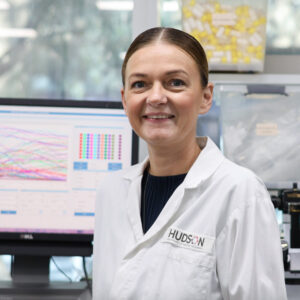When Angelina Reardon went in for a routine scan in 2021, she never imagined her life was about to change forever. What doctors first thought was a harmless cyst turned out to be stage 3C low-grade serous ovarian cancer.
"I woke up from surgery expecting good news," Angelina recalls. "Instead, I was told it was ovarian cancer in both ovaries and the omentum. I was shocked."
Looking back, she realises the signs were there-bloating, frequent urination, abdominal pain-but like so many women, she dismissed them as menopause.
A journey of strength and setbacks
Angelina endured major surgery and chemotherapy, and for three years she lived in remission. But in 2024, the cancer returned. Another surgery followed, this time with complications that tested her resilience even further.
Today, Angelina is part of a clinical trial and despite everything, she remains grateful: "I'm still here to tell my story. And I want to use it to help others." And, as a regular giver, Angelina is also helping create more hope for more women like her through her donations.
Why research matters
Ovarian cancer is one of the deadliest cancers, with survival rates that have barely improved in decades. By the time ovarian cancer is usually detected, it is already advanced. Treatments have changed little in 30 years, leaving women like Angelina to face the same options, their mothers and grandmothers once had.
That's why Angelina is passionate about the research happening here at Hudson Institute, led by Dr Maree Bilandzic and is also a regular giver.
Dr Maree Bilandzic's groundbreaking work is uncovering how ovarian cancer spreads, resists treatment, and returns-knowledge that could transform the way this disease is treated.
"Research is so important," Angelina says. "There's no test for ovarian cancer, and symptoms can be minimal. I hope and pray they will find a test and a cure soon."
How you can help
Angelina's story is one of courage-but it's also a call to action. Every breakthrough in ovarian cancer research brings us closer to earlier detection, better treatments, and longer lives.
By supporting this ovarian cancer research, you are giving women like Angelina something priceless: hope.








